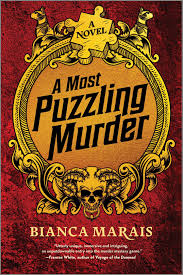You know that scene from The Lion King where the hyenas keep repeating Mufasa’s name to give themselves the heebie-jeebies? If you want to see mystery and thriller writers react similarly, quote the famous EL Doctorow quote. “Writing is like driving at night in the fog. You can only see as far as your headlights, but you can make the whole trip that way.”
Most crime writers I know don’t want to navigate in the fog with just their headlights to guide them. Hell, they’ll probably refuse to drive at night at all! Upon finding themselves in this predicament, they’re likely to pull over, place booby traps around the perimeter of the vehicle, lock the doors, and await the dawn with a weapon or two in hand. After all, they’re crime writers; they know exactly what kind of terrors await just beyond the darkness. Only once the sun is up will they burn rubber on a highway that unfurls before them like a giant arrow home.
Suffice to say, crime writers are, for the most part, plotters, the ultimate puppet masters who carefully plan every single twist and turn in their novels. Before they even write the first word, they know their readers will be biting their nails by the end of chapter four, not to mention audibly gasping midway through chapter seven. They’ve mapped it all out, either in their minds, or against their office walls using thousands of multi-coloured Post-it notes and twine.
Now, in contrast, imagine a writer who not only courts the fog and darkness, but who’ll only get behind the wheel after taking a baseball bat to both headlights and then donning a blindfold. That’s what it’s like to be a pantser (a writer who flies by the seat of their pants) writing a closed room murder mystery. It’s not for the faint of heart.
But it is possible, which is exactly what I set out to prove when I started writing A Most Puzzling Murder, a not-so-cozy murder mystery that’s like Glass Onion meets Succession, but with magical people. The book is filled with puzzles and riddles, as well as Choose Your Own Conundrum chapters that include philosophical thought experiments. Plus, you’re able to email the main character for clues! Fun, right?!
The genesis of the story began the way all my novels do, with a main character burning brightly in my imagination. I knew Destiny Whip was a former child prodigy who’d worked as an enigmatologist until tragedy struck, making her a recluse. And that it would be the arrival of a mysterious letter that would lure her out to Eerie Island.
From there, the setting came alive as I envisioned a gothic castle perched on a rocky island, cobblestone streets glistening like eyeballs beneath horses’ hooves as carriages trundled back and forth in stormy weather.
Soon after, the Scruffmore family members stopped being merely shadowy outlines of a magical monarchy vying for dominance, and began coming into stark relief.
But that’s all I had. Vibes and characters.
In terms of actual plot, all I knew was what the genre conventions dictated: that someone had to die, thus making someone else a murderer who would need to have means, motive, and opportunity. I had no idea who the victim would be. Why they would be killed. How they’d be killed. Or how my protagonist would solve the mystery.
At first, I tried to heed the warnings of countless experienced mystery authors who advised that I had to, at the very least, begin with an outline. But the more I outlined, the less inclined I was to write the story. I always write to find out what happens, and apparently a genre jump wasn’t going to change that. And so I gave up on trying to control it, and trusted that my characters would take me where we needed to go.
The incredible thing about allowing a character like Destiny to lead is that her personal qualities become plot-drivers. She’s observant and has a mind that never rests, not even when she’s sleeping. And so, she’d be in a scene interacting with a tertiary character, but she’d notice something decidedly off about their behaviour. Which would then force me to scrutinize them, only to discover they weren’t the tertiary character they were pretending to be!
From there, as I turned the spotlight on the many POV characters, they each revealed their petty jealousies and deep insecurities, as well as the grudges they’d been nursing for decades and the ambitions they harboured for the future. Allowing each character the protagonism to do their own thing, driven by their own passions, created an engine for the plot.
If Mordecai Scruffmore was a terrible father, whose children all either despised him or were desperate for his love, then it made sense that they would probably plot against him or do his bidding to curry favour. If the family members were fighting for magical dominance, then any of them could become murderers. Or victims. All I had to do was interrogate them to discover what they wanted most, what their personal stakes were, and how far they’d go to gain their heart’s desire.
And all Destiny had to do was just be herself, pay close attention, and let me tag along as she figured it all out.
While I never plotted, what I was forced to do halfway through was reverse outline so that I had a record of who knew what at every point in the story. With multiple POV characters (including that of a raccoon) it felt a bit like juggling Jello to keep up with who’d told what to whom. There were so many lies and misdirections that it all became rather knotted.
What I loved, though, was how I was on the edge of my seat waiting to find out what would happen next. If I was shocked by the multiple twists, then surely my readers would be too. Most of the reveals aligned organically, as though my subconscious had been leading me to them all along. When they didn’t, I was able to go back and plant curiosity seeds, hiding them in plain sight while watering them so they could bloom at just the right times.
It’s a strange approach to writing, I know. Especially considering that I’m a complete control freak in all other aspects of my life. Perhaps that’s what I love most about writing, how it allows me to let go of the reins and let my characters be in complete control. Even when what they have on their minds is mayhem and murder.
***


















